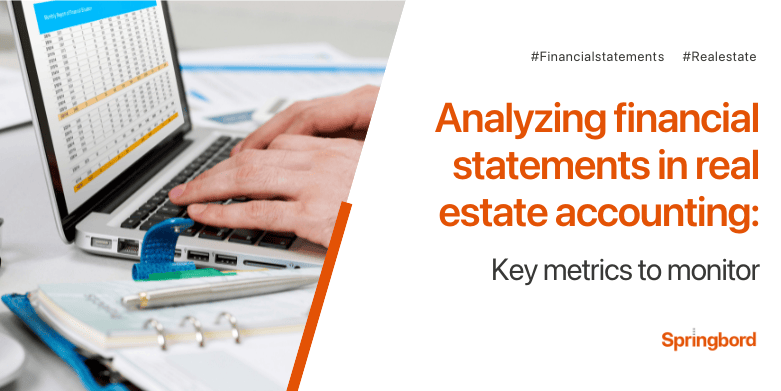 Read time 5 min
Read time 5 minFinancial statements are the backbone of any real estate decision-making process. They provide invaluable insights into the financial health, performance, and potential risks associated with real estate assets. Understanding these statements is paramount for investors, developers, lenders, and other stakeholders involved in the real estate industry.
Real estate finance presents unique challenges due to the complexity of property valuation, mortgage structures, and equity considerations.
To navigate this complexity effectively, it’s essential to have a thorough understanding of financial statements and their implications.
At Springbord, we specialize in transforming financial data into actionable insights for our clients in the real estate sector.
In this comprehensive guide, we’ll delve into the core financial statements in real estate, highlighting key components, analysis techniques, and strategies to maximize financial performance.
Core Financial Statements in Real Estate
Balance Sheet Analysis:
The balance sheet is a snapshot of a company’s financial position at a specific point in time. In real estate, it encompasses property valuations, mortgages, equity, and other assets and liabilities specific to the industry.
One common pitfall in balance sheet analysis is overlooking the true value of real estate assets. According to a report by Deloitte, discrepancies in property valuation can significantly impact financial reporting and decision-making processes.
At Springbord, we employ advanced valuation techniques to ensure accurate asset assessment and mitigate risks associated with valuation discrepancies.
Income Statement Insights:
The income statement provides a summary of a company’s revenues, expenses, and profits over a specified period. In real estate, revenue streams typically include rental income, property sales, and other ancillary income sources, while expenses encompass maintenance, management fees, and interest expenses.
Profitability metrics such as net operating income (NOI) and capitalization rate (cap rate) are crucial for evaluating the financial performance of real estate assets.
Benchmarking these metrics against industry standards allows stakeholders to gauge their competitiveness and identify areas for improvement.
Cash Flow Statement Understanding:
The cash flow statement tracks the inflow and outflow of cash during a specific period, categorizing cash flows into operating, investing, and financing activities. In real estate, understanding these cash flows is essential for strategic planning, investment analysis, and cash flow optimization.
Forecasting cash flows enables stakeholders to anticipate future financial needs, evaluate investment opportunities, and mitigate liquidity risks.
At Springbord, we leverage sophisticated forecasting models and scenario analysis to help our clients make informed decisions and optimize cash flow in property management.
Advanced Financial Analysis Techniques
Valuation Models:
Property valuation is a fundamental aspect of real estate finance, influencing investment decisions, financing arrangements, and portfolio management strategies. Various valuation methods, such as discounted cash flow (DCF), capitalization rate (cap rate), and comparable sales (comps), offer distinct perspectives on property value.
At Springbord, we employ a comprehensive approach to property valuation, integrating quantitative models with qualitative insights to ensure accuracy and reliability.
Our team utilizes advanced statistical analysis to identify market trends, assess property performance, and optimize valuation outcomes. By leveraging cutting-edge valuation techniques, we empower our clients to make informed investment decisions and maximize returns in the real estate market.
Investment Performance Metrics:
Measuring investment performance is essential for evaluating the effectiveness of real estate investments and optimizing portfolio returns. Key performance metrics such as return on investment (ROI), return on equity (ROE), internal rate of return (IRR), and net present value (NPV) provide valuable insights into profitability, risk, and efficiency.
Springbord specializes in leveraging these metrics to drive portfolio optimization and strategic decision-making for our clients.
Through advanced analytics and scenario analysis, we assess investment opportunities, identify value-enhancing strategies, and prioritize resource allocation to achieve optimal risk-adjusted returns. Our data-driven approach enables our clients to navigate complex investment landscapes with confidence and precision.
Risk Management Strategies:
Real estate investment involves inherent financial risks, including market volatility, economic fluctuations, and operational uncertainties. Effective risk management is essential for mitigating these risks and safeguarding investment capital.
Springbord excels in crafting tailored risk management solutions for our real estate clients, combining financial modeling, scenario analysis, and risk mitigation strategies. By quantifying and prioritizing risk factors, we help clients anticipate potential challenges, implement proactive measures, and optimize risk-return profiles.
Our proactive approach to risk management ensures resilience and stability in the face of uncertainty, enabling our clients to achieve their financial objectives with confidence.
Regulatory Compliance and Reporting
Real Estate Financial Compliance Requirements:
Compliance with financial reporting standards is paramount in the real estate industry to ensure transparency, accuracy, and accountability. Generally Accepted Accounting Principles (GAAP), International Financial Reporting Standards (IFRS), and local regulations impose specific requirements for real estate financial reporting.
Springbord provides a detailed guide on navigating these compliance requirements, offering technical expertise and practical insights to ensure adherence to regulatory standards.
Our team stays abreast of evolving accounting standards and regulatory changes, helping clients navigate complex reporting obligations and mitigate compliance risks effectively.
Impact of Regulatory Changes:
Regulatory changes can significantly impact financial reporting practices and management strategies in the real estate sector. Changes in lease accounting standards, tax regulations, and disclosure requirements necessitate proactive adaptation to ensure compliance and minimize disruption.
At Springbord, we understand the implications of regulatory changes on financial reporting and services. Our proactive approach to regulatory compliance enables us to anticipate changes, assess their impact, and implement timely adjustments to financial processes and reporting frameworks.
By staying ahead of regulatory developments, we help our clients mitigate compliance risks and maintain regulatory compliance with confidence.
Leveraging Technology in Financial Analysis
Latest Technology Trends:
Technology is revolutionizing financial analysis in the real estate industry, offering advanced tools and capabilities to enhance efficiency, accuracy, and decision-making. Emerging trends such as artificial intelligence (AI), machine learning, and blockchain are transforming traditional financial workflows, enabling deeper insights and more informed decision-making.
Springbord provides an overview of the latest technology trends in real estate financial analysis, highlighting the transformative potential of AI, machine learning, and blockchain.
By harnessing the power of these technologies, real estate professionals can streamline data analysis, automate repetitive tasks, and uncover actionable insights to drive strategic decision-making and optimize financial performance.
Springbord’s Capabilities:
Springbord is at the forefront of integrating technology solutions into real estate financial workflows, offering cutting-edge tools and expertise to our clients. Our team leverages advanced analytics platforms, AI-driven algorithms, and blockchain technology to enhance data processing, risk assessment, and decision support.
Through our technology-driven approach, we empower clients to streamline financial analysis processes, improve forecasting accuracy, and identify growth opportunities with greater precision.
By harnessing the power of technology, Springbord enables our clients to stay ahead of the curve in today’s rapidly evolving real estate landscape.
In Conclusion
Financial statements are the cornerstone of strategic decision-making in real estate, providing vital insights into asset performance and financial health. Advanced analysis techniques, integration of technology, and strict adherence to compliance standards are essential in navigating the complexities of the industry.
At Springbord, we offer comprehensive services spanning financial statement analysis, regulatory compliance, and technological innovation, empowering real estate businesses to unlock financial insights and drive growth.
Through our tailored solutions and real-world case studies, we demonstrate our commitment to helping clients thrive in the dynamic real estate market.
Contact us today to discover how Springbord can support your real estate business with our expert financial services.







